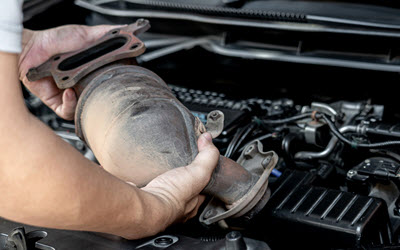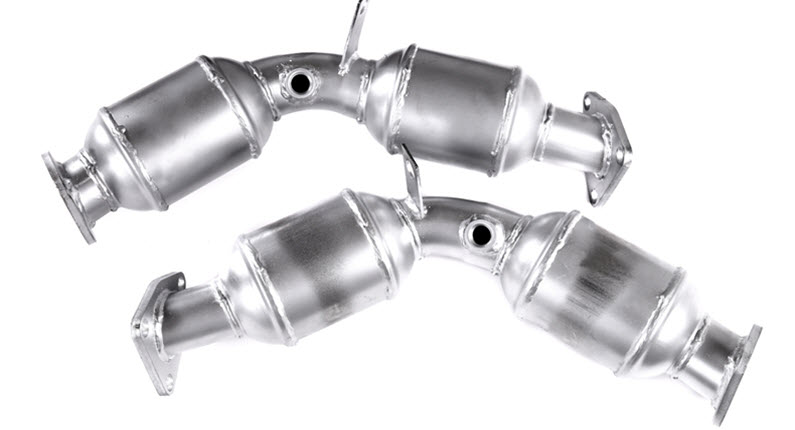Have you noticed constant unpleasant fumes coming from your Audi? The root of this problem may well rest in the health of your car’s catalytic converter. When the catalytic converter fails to function properly, it can lead to the release of pollutants that not only compromise your Audi’s performance but also contribute to environmental deterioration.
How The Catalytic Converter Works
The catalytic converter, often abbreviated as the “cat converter,” is a key component of your Audi exhaust system. Its primary role is to transform harmful pollutants produced during the combustion process into less harmful substances before they are released into the atmosphere. The converter achieves this through a series of chemical reactions, which predominantly involve the conversion of carbon monoxide (CO) into carbon dioxide (CO2), nitrogen oxides (NOx) into nitrogen (N2) and oxygen (O2), and unburned hydrocarbons into water vapor (H2O) and carbon dioxide (CO2).
This car component is situated between the exhaust manifold and the muffler. As exhaust gasses flow through its honeycomb-like structure, the converter’s internal catalysts promote the conversion of noxious gasses into benign elements. The catalysts, typically composed of precious metals like platinum, palladium, and rhodium, act as accelerants for these reactions.
Catalytic Converter and Other Components
The functioning of the catalytic converter is closely intertwined with various other components of the engine and emission control system. The engine’s combustion process generates the gasses that flow through the exhaust system and into the converter. This intricate relationship highlights the importance of maintaining all parts of the engine in optimal condition, as a malfunction in one area can have cascading effects on others, ultimately impacting the performance of the catalytic converter.
When Is Catalytic Converter Replacement Necessary?
Recognizing the signs of catalytic converter degradation is essential to ensure optimal engine performance.
- Declined Engine Performance: A failing catalytic converter can significantly impact the engine’s overall performance. As the converter becomes clogged or deteriorates, it restricts the exhaust flow and leads to a decrease in engine power. Drivers may notice sluggish acceleration, reduced responsiveness, and an overall lack of the smoothness that characterizes a well-functioning engine. This decline in performance is often a clear indication that the catalytic converter is struggling to perform its emission-reducing duties.
- Reduced Fuel Efficiency: Efficient fuel combustion and exhaust flow are critical for optimal fuel efficiency. When a catalytic converter degrades, it can disrupt the delicate balance of these processes. This disruption may lead to poor fuel combustion, causing the engine to burn more fuel than necessary to achieve the same level of performance. Consequently, drivers might observe a significant drop in fuel efficiency, necessitating more frequent refueling and increasing the cost of vehicle operation.
- Illumination of the “Check Engine” Light: Modern vehicles are equipped with sophisticated onboard diagnostics systems that monitor various aspects of the engine’s performance, including emissions. When the catalytic converter’s efficiency diminishes, or it becomes obstructed, the computer system may detect irregularities in the exhaust gasses. This triggers the illumination of the “Check Engine” light on the dashboard. While this light can indicate a range of issues, a catalytic converter problem should not be ruled out, especially if other symptoms are present.
- Rotten Egg Odor from the Exhaust: One of the most distinctive signs of a deteriorating catalytic converter is the presence of a sulfuric or rotten egg smell emanating from the exhaust. This odor is a result of the converter’s reduced ability to convert hydrogen sulfide, a common component of exhaust gasses, into less harmful compounds. The smell is not only unpleasant but also indicative of inefficient emission control. If this odor is noticeable, it’s crucial to have the catalytic converter inspected and replaced if necessary.
Maintaining The Performance Of Your Audi’s Catalytic Converter at Heynneman European
The condition of your Audi’s catalytic converter  is important in ensuring not only a smooth-running vehicle but also a cleaner environment. At Heynneman European, we specialize in providing comprehensive solutions for Audi catalytic converter concerns. Our team is well-versed in diagnosing and addressing these issues to help restore optimal performance and reduce harmful emissions. Whether you’re in Larkspur, Kentfield, Corte, Mill Valley, San Anselmo, Fairfax, San Rafael, CA, or nearby areas, our experts are dedicated to assisting you.
is important in ensuring not only a smooth-running vehicle but also a cleaner environment. At Heynneman European, we specialize in providing comprehensive solutions for Audi catalytic converter concerns. Our team is well-versed in diagnosing and addressing these issues to help restore optimal performance and reduce harmful emissions. Whether you’re in Larkspur, Kentfield, Corte, Mill Valley, San Anselmo, Fairfax, San Rafael, CA, or nearby areas, our experts are dedicated to assisting you.
Book an appointment with us today and allow us to address your Audi needs with precision and care.

